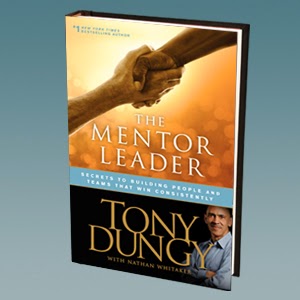- Four teenage guys whom I've had the pleasure of coaching in football.
- Almost 20 incarcerated men who are leaders in the Character-based Housing Unit (CHU) program at Allendale Correctional Institute.
The focus of this book is that mentor leadership is about building into the lives of others, not about having an authoritative position. True mentor leaders add value to those around them, instead of looking for glory and recognition.
This time through, I've particularly enjoyed Chapter 8, "The Methods of a Mentor Leader: The Seven E's of Enhancing Potential." Dungy describes a progression of steps that will help others reach their potential.
Here are the seven steps, all beginning with the letter "E":
- Engage. Before all else, you must be their friend first. They have to know that you care. Note that this step is about being at their level.
- Educate. We all have something that we can teach and pass on to others. You must still start at their level.
- Equip. You show them where they need to be, and help get them there. Again, you are still at their level.
- Encourage. We must understand how to communicate effectively, and treat people like they are volunteers.
- Empower. Finally, we are working to bringing them to a new level. This step means "appropriate" freedom, not completely releasing someone.
- Energize. While empowering (#5) gets them going, this step is the sustaining. You have to keep giving them energy and motivation.
- Elevate. The ultimate goal is to help someone get to a level above your own. You have to swallow your pride to make this happen, but it is what a mentor leader is called to do.
I like that Dungy explains that this is a progression. That is, we can't educate until we engage, we can't equip and empower unless we first educate, and so on. And it all comes down to having meaningful and trust-filled relationships (a key point in this talk on Leadership Values: Building Relational Capital).
So, that leaves us with this thought: Who are you (and who am I) building into? Who are we engaging for the ultimate goal of being a blessing to them?
Related Links:

No comments:
Post a Comment